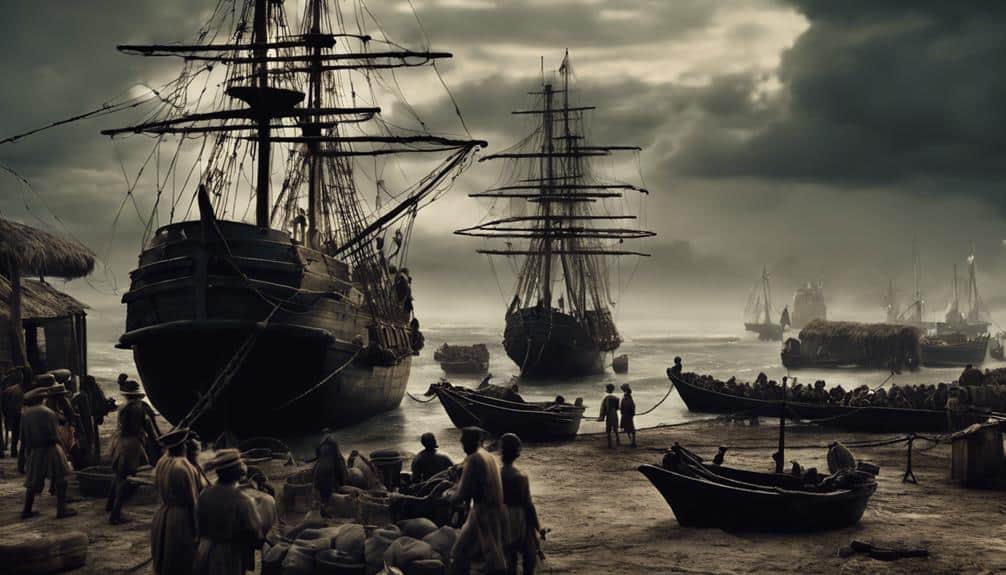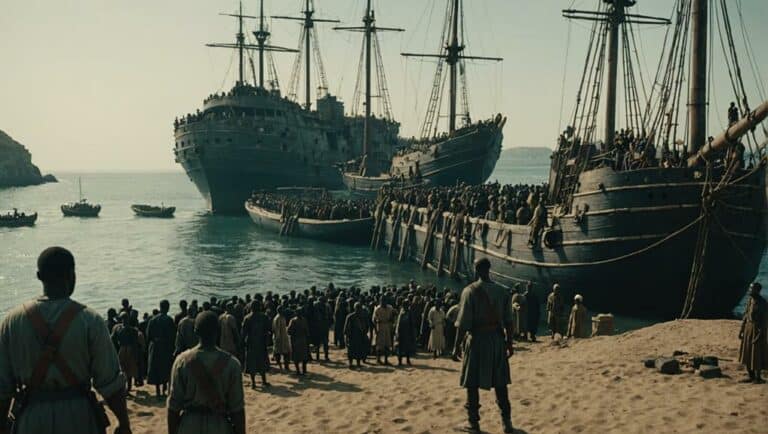European colonization ignited the African slave trade, exploiting local rivalries and establishing lucrative but devastating systems of forced labor.
Discover how these historical events reshaped economies, decimated societies, and continue to influence modern discussions on social justice and inequality.
Origins of the Trans-Atlantic Slave Trade
Tracing the origins of the trans-Atlantic slave trade reveals how European powers like Portugal exploited African resources and labor to fuel their economic ambitions. The Portuguese initiated this dark chapter by capturing or purchasing Africans to toil in gold mines and on plantations. This exploitation wasn't isolated; it was systematic and devastating. Conflict within Africa made many people vulnerable, allowing European traders to enslave millions.
The trans-Atlantic slave trade was a complex network. Portugal, collaborating with Spain, established and maintained routes that forcibly transported Africans across the Atlantic. These enslaved people were then sold into brutal labor conditions on American plantations. Over the centuries, this trade turned into a massive operation, forcibly relocating millions of Africans.
The scale of this trade is staggering. It wasn't merely a series of transactions but a sustained effort that reshaped entire societies. Africans were treated as commodities, their lives irreversibly altered by the European demand for cheap labor.
This barbaric trade lasted for centuries, embedding a painful legacy that continues to affect descendants of those enslaved. Understanding these origins provides essential context for the trans-Atlantic slave trade's lasting impact on global history.
European Involvement and Strategies

European nations, driven by the demand for cheap labor in their colonies, implemented strategic alliances with African rulers to capture and trade enslaved Africans. This collaboration was central to the transatlantic slave trade, wherein European traders exchanged goods like firearms, alcohol, and textiles for human lives.
These alliances weren't merely transactional; they reshaped entire power dynamics within African societies, fostering dependency and competition among local leaders.
European colonization disrupted African economies and social structures, making the capture and sale of enslaved Africans both a necessity and an opportunity for many African rulers. These rulers, in turn, facilitated the steady supply of labor required by European colonies in the Americas. The European traders' strategies were meticulously planned to maximize European profits and sustain the burgeoning industries reliant on enslaved labor.
- Economic Exploitation: European traders capitalized on existing rivalries among African rulers to secure a continuous supply of enslaved Africans.
- Supply Routes: Strategic coastal forts and trading posts were established to streamline the logistics of the transatlantic slave trade.
- Industrial Growth: The profits from the African slave trade significantly contributed to the economic growth and industrialization of Europe and its colonies.
Impact on African Societies

The Atlantic slave trade inflicted profound and lasting damage on African societies, resulting in population loss, economic disruption, and political instability. You can see how the forced removal of millions of Africans led to significant population decline. This loss of able-bodied individuals caused economic stagnation, as communities lost their primary labor force.
The absence of so many people weakened political structures, leaving societies vulnerable to further exploitation. European colonization exacerbated these issues by perpetuating the exploitation of African resources and labor. The introduction of firearms into African societies intensified warfare, further destabilizing regions and accelerating social disintegration.
Conflicts fueled by the desire to capture more slaves for trade created a vicious cycle of violence and instability. The long-term consequences of this period continue to reverberate today. As a result, many African societies grapple with deep-seated issues of poverty and inequality.
The legacy of the slave trade has left a lasting impact on development, contributing to underdevelopment and pervasive socioeconomic challenges. Understanding this historical context is vital for grasping the complex dynamics that have shaped modern African societies and their ongoing struggles.
The Middle Passage Experience

While the impact on African societies paints a broad picture of devastation, the Middle Passage experience reveals the harrowing and immediate human suffering endured by enslaved Africans during their forced transatlantic journey.
The Middle Passage was a horrific transatlantic route where enslaved Africans were packed tightly on ships, facing disease, starvation, and death. Brutal conditions aboard these vessels resulted in high mortality rates; only an estimated 10.7 million survived the journey.
Most enslaved Africans transported during the Middle Passage were destined for labor on sugarcane plantations in Brazil and the Caribbean. Only about 3.5% ended up in British North America and the United States. The Middle Passage marked a tragic chapter in history, with millions of lives lost and a lasting impact on African diaspora communities.
- Cramped Quarters: Enslaved Africans were packed tightly, with little room to move, leading to the rapid spread of disease.
- Starvation and Dehydration: Meager rations and contaminated water sources exacerbated the suffering of those on board.
- Violence and Abuse: The enslaved faced constant threats of physical abuse, further exacerbating their plight.
This tragic chapter underscores the immense human cost of the transatlantic slave trade.
Abolition and Legacy

Abolitionists in Great Britain catalyzed a global movement that eventually led to the United States banning the importation of enslaved people in 1808. This significant step marked a shift in how colonies and local economies viewed the transatlantic slave trade. Influenced by the abolitionist movement, the ban reflected changing attitudes among groups like the Virginia planters, who began to see the moral and economic implications of relying on enslaved labor.
However, the ban didn't end slavery; instead, it transformed it. The surplus of enslaved people from Africa in states like Virginia fueled the domestic slave trade, redistributing enslaved laborers across the country. This internal trade became a brutal system that persisted until the American Civil War.
The legacy of European colonization and the transatlantic slave trade still impacts contemporary issues of social justice, race, and inequality in the United States. Efforts to understand and address this legacy are ongoing, as the nation grapples with the long-term consequences of centuries of exploitation and oppression.
Recognizing this history is essential for fostering a more equitable society, one that acknowledges the enduring influence of past injustices on present realities.


